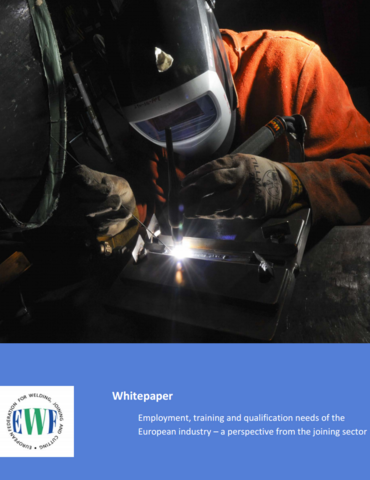Der EWF – European Federation for Welding, Joining and Cutting veröffentlicht ein Whitepaper mit einer lesenswerten Zusammenfassung über die Bedeutung der schweißtechnischen Industrie für die wirtschaftliche Entwicklung in Europa. Das Whitepaper nimmt dazu auch Argumente des DVS – Deutscher Verband für Schweißen und verwandte Verfahren – und der GSI – Gesellschaft für Schweißtechnik International - auf, einschließlich der DVS Studienergebnisse zur wirtschaftlichen Bedeutung der Fügetechnik in den europäischen Ländern.
Zitat aus dem Whitepaper:
“Europe has signalled that industry plays a critical growth area for the region as well as of key importance for Europe´s economic recovery and competitiveness. This relevance has been highlighted by the Commissions´s Industrial Renaissance in Europe communication as well as, amongst other initiatives, the launch of the Technology Platform “Manufuture” and, more recently, the creation of the Joining Sub-Platform within Manufuture.” (S.3)
“With Joining being the most important fabrication technique used in manufacturing - joining as a key enabling technology to manufacturing - joining technologies represent the central challenge in modern process chains, as they are often a factor that can run up the costs, as well as have the potential to be a cost-saver.” (S. 8)
“Joining is a profession with increasing demand, both in terms of professionals as in terms of qualifications and certification of its professionals. And it is also cross-generation, with opportunities abounding for both the younger professionals as well as for the most skilled and mature ones. To ensure that needs are met, the latest education techniques should be leveraged to bring new professionals into the industry, securing its future.” (S. 11)
Auch die Beschäftigungssituation in vielen europäischen Ländern wird in dem Whitepaper aufgenommen und eindringlich beschrieben:
“[…] most recent data from Eurostat show, unemployment rate remains high, at 11.2 % in January 2015, down slightly from 11.8 % in January 2014. […] Still, even in face of this high unemployment, the renewal process of specialized welding professionals does not support market needs. Even more worrying and specifically for the younger generations, economists predict the today´s youth faces the very real prospect of ending up worse off – materially, professionally and socially – than their parents because of the high unemployment in Europe, so industries with job needs should be given special attention to attract future professionals.
Putting the issue of employability potential into perspective, in Europe alone there are around 1,9 Million full-time-equivalent joining specialists, according to the study (DVS study, Anm. d. Red.) “The Economic Importance of Welding and Joining in Europe”. On one side, experienced welders are getting old and are retiring, according to the natural cycle of life. On the other side, the entrance in the labour market of new welding professionals does not meet its current needs. So, in summary, in order to maintain the quality level in manufacturing and the engineering sector at large, and to prevent future issues with professionals´ shortage, it is fundamental to invest in people´s training and qualification”. (S. 4)
In diesem Sinne argumentiert das Whitepaper in Übereinstimmung mit DVS und GSI – besonders, was die Notwendigkeit einer kontinuierlichen Investition in Aus- und Weiterbildung angeht – auch unter Verwendung moderner Lehr- und Lerntechniken (e-Learning, Blended Learning etc.):
“[…] this document highlights the need for more welding and joining professionals. It also highlights the relevance of increasingly sophisticated distance learning technologies […]”. (S. 4)
Einigkeit besteht darin, dass weitere starke Initiativen notwendig sind, um die Fügetechnik weiterzuentwickeln. Diesbezüglich bietet sich für DVS und GSI die aktive Mitwirkung im Netzwerk der EWF an:
“To ensure the long-term success of the profession, further initiatives are required, such as working closely with EWF members to qualify existing workforce and get them up to speed on the new technologies and materials used in joining. Also, looking ahead, reaching out to secondary school students, reinforcing the distance-learning modules, creating new mobile programs and solutions that respond to current and future workforce needs and methods, as well as to technological evolution. These challenges are the cornerstone of future evolution of Joining technology and where EWF will be working in the future to develop its programs and initiatives.” (S. 15)
Link zum EWF Whitepaper
Ansprechpartner: Klaus Middeldorf




